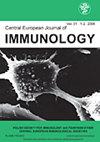医护人员接种 COVID-19 疫苗:长期益处和保护
IF 1.6
4区 医学
Q4 IMMUNOLOGY
引用次数: 0
摘要
导言:本研究旨在通过分析两年后人群对疫苗的反应(基于抗SARS-CoV-2蛋白S抗体水平),评估COVID-19疫苗接种在医护人员中的长期有效性。此外,该研究还旨在评估基本因素对抗体水平的影响。材料和方法:该研究共纳入了 4,090 名医护人员,并使用 ELISA 检测抗 SARS-CoV-2 免疫球蛋白 G (IgG) 来测量他们的抗体水平。结果与结论:大多数参与者(85.1%)接种了辉瑞/BioNTech 公司的疫苗,小部分人选择了阿斯利康和强生等载体疫苗。在所有疫苗中,COVID-19 在接种者中的发病率都相对较低,这证实了它们在预防无症状 SARS-CoV-2 感染方面的有效性。研究发现,研究人群中的 IgG 抗体水平存在差异,只有 0.46% 的人抗体检测呈阴性。抗 SARS-CoV-2 IgG 的平均值在感染或接种疫苗后连续 3 个月内有显著差异,随着时间的推移逐渐下降。值得注意的是,前 6 个月的抗体水平变化最为明显(平均值从 3647.11 BAU/ml 到 2601.49 BAU/ml)。随后,抗体水平略有波动,平均值徘徊在 2000 BAU/ml 左右。自发病起连续 3 个月的抗 SARS-CoV-2 IgG 平均值之间的差异具有统计学意义。本文章由计算机程序翻译,如有差异,请以英文原文为准。
COVID-19 vaccination in healthcare workers: Long-term benefits and protection
Introduction:
This study aimed to evaluate the long-term effectiveness of COVID-19 vaccination in healthcare workers by analyzing the population’s response to the vaccine after two years, based on anti-SARS-CoV-2 protein S antibody levels. Additionally, the study aimed to assess the impact of basic factors on antibody levels.
Material and methods:
A total of 4,090 healthcare workers were included in the study, and their antibody levels were measured using ELISA to detect anti-SARS-CoV-2 immunoglobulin G (IgG). Statistical analysis was conducted to examine the influence of COVID-19 infection, vaccination status, and number of vaccine doses on antibody concentrations.
Results and Conclusion:
The majority of participants (85.1%) received the Pfizer/BioNTech vaccine, while a smaller percentage chose vector vaccines such as AstraZeneca and Johnson & Johnson. The incidence of COVID-19 among vaccinated individuals was relatively low for all vaccines, confirming their effectiveness in preventing symptomatic SARS-CoV-2 infection. The study observed variations in IgG antibody levels within the study population, with only 0.46% of individuals testing negative for the presence of antibodies. The average anti-SARS-CoV-2 IgG values showed significant differences across consecutive 3-month periods following infection or vaccination, with a gradual decrease over time. Notably, the most significant changes in antibody levels were observed within the first 6 months (mean values ranged from 3647.11 BAU/ml to 2601.49 BAU/ml). Subsequently, minor fluctuations were observed, with mean antibody values hovering around 2000 BAU/ml. The differences between average anti-SARS-CoV-2 IgG values between consecutive 3-month periods from disease onset were statistically significant.
This study aimed to evaluate the long-term effectiveness of COVID-19 vaccination in healthcare workers by analyzing the population’s response to the vaccine after two years, based on anti-SARS-CoV-2 protein S antibody levels. Additionally, the study aimed to assess the impact of basic factors on antibody levels.
Material and methods:
A total of 4,090 healthcare workers were included in the study, and their antibody levels were measured using ELISA to detect anti-SARS-CoV-2 immunoglobulin G (IgG). Statistical analysis was conducted to examine the influence of COVID-19 infection, vaccination status, and number of vaccine doses on antibody concentrations.
Results and Conclusion:
The majority of participants (85.1%) received the Pfizer/BioNTech vaccine, while a smaller percentage chose vector vaccines such as AstraZeneca and Johnson & Johnson. The incidence of COVID-19 among vaccinated individuals was relatively low for all vaccines, confirming their effectiveness in preventing symptomatic SARS-CoV-2 infection. The study observed variations in IgG antibody levels within the study population, with only 0.46% of individuals testing negative for the presence of antibodies. The average anti-SARS-CoV-2 IgG values showed significant differences across consecutive 3-month periods following infection or vaccination, with a gradual decrease over time. Notably, the most significant changes in antibody levels were observed within the first 6 months (mean values ranged from 3647.11 BAU/ml to 2601.49 BAU/ml). Subsequently, minor fluctuations were observed, with mean antibody values hovering around 2000 BAU/ml. The differences between average anti-SARS-CoV-2 IgG values between consecutive 3-month periods from disease onset were statistically significant.
求助全文
通过发布文献求助,成功后即可免费获取论文全文。
去求助
来源期刊

Central European Journal of Immunology
IMMUNOLOGY-
CiteScore
3.00
自引率
0.00%
发文量
17
审稿时长
6-12 weeks
期刊介绍:
Central European Journal of Immunology is a English-language quarterly aimed mainly at immunologists.
 求助内容:
求助内容: 应助结果提醒方式:
应助结果提醒方式:


